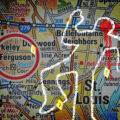By Earl Ofari Hutchinson
ABOVE PHOTO: This March 31, 1991 frame from a video tape shot by George Holliday from his apartment in a suburb of Los Angeles shows what appears to be a group of police officers beating a man, later identified as Rodney King, with nightsticks and kicking him as other officers look on. The April 29, 1992 acquittal of four police officers in the beating sparked rioting that spread across the city and into neighboring suburbs. Cars were demolished and homes and businesses were burned. Before order was restored, 55 people were dead, 2,300 injured and more than 1,500 buildings were damaged or destroyed.
(AP Photo/George Holliday/Courtesy of KTLA Los Angeles)
As president of the Los Angeles Urban Policy Roundtable, social commentator, and longtime critic of many of the Los Angeles Police Department’s racial practices, the invitation I got three years ago was unprecedented. Then Los Angeles Police Chief William Bratton called and asked me to be his special guest at the graduation ceremony for the new crop of LAPD officers at the Los Angeles Police Academy. I sat next to Bratton in the reviewing area and watched the cadet’s parade by in impressive march order. I was struck by the racial and gender diversity of the young officers. But I was even more impressed by Bratton’s address to the officers. He praised their work, effort, commitment, and dedication.
But he also sternly admonished that they had a strict obligation to bring honor to the LAPD and that meant always displaying professionalism, respect for citizens, and adherence to rights. The message was clear. There would be zero tolerance toward abuse, violence, and misconduct. Bratton’s stern admonition that the LAPD would continue to be a kinder, gentler, law-abiding department was one of the high moments for the LAPD. It was in sharp contrast to the words of another officer nearly two decades earlier.
One of the lowest moments for the Los Angeles Police Department came when LAPD sergeant Stacey Koon publicly defended the use of force against black motorist Rodney King as legal and appropriate during testimony in his trial for beating King. Much of the world, horrified by the videotaped beating, thought differently. Though he and the three other officers that beat King were acquitted by a Simi Valley jury for beating King, it sparked the most destructive riot in U.S. history. After his acquittal, the long-time veteran was retried, convicted, and served prison time for violating King’s civil rights. The LAPD got most of the finger-point for triggering the riots through its brutal, abusive, and racist policies. Koon’s damning indictment piled on top of the mountain of other damning indictments against the LAPD iced the troubled department’s cake.
In the next decade, there would be much hand-wringing and soul-searching over how to reform the LAPD, complete with investigations, commissions, voluminous reports, city charter changes, a federal consent decree, and the appointment of two reform-minded chiefs. The aim of all of this was to transform the LAPD from the nation’s poster-agency police department for out of control abuse, violence, and bigotry to a clean, efficient, community-oriented police department. It was more than a case of image makeover. It was a desperate need for a profound course correction in the way the LAPD did business.
The changes were soon visible. Successive LAPD chiefs disciplined, suspended and fired officers for misconduct. The use of force by officers dropped. Citizen complaints leveled off. LAPD officials became constant presences at community events, meetings and forums, always pushing partnership and dialogue with the community leaders. That topped by its annual Martin Luther King breakfast with community leaders There were aggressive policy changes by the Los Angeles Police Commission, the civilian oversight agency, and the LAPD Inspector-General. None of these things would have had the remotest chance of happening a decade earlier. Though LAPD top brass continued to loudly protest that racial profiling didn’t exist despite legions of racially based complaints against the department, there was still the sense that the LAPD had turned the corner. Polls did show that more blacks than ever expressed guarded support for the LAPD.
But while the LAPD has clearly changed, there are still some of the old troubling signs that much more needs to be done, especially when it comes to the most volatile issue — the use of deadly force. The killing of a young unarmed black man, Reginald Doucet, in 2011, the Wild West-style massive shootout (90 bullets) at a suspect after a chase in early April 2012, and the revelation that an officer racially profiled Latino motorists are among those signs. The racial profiling case raised the obvious question if one officer was caught profiling, how many officers may be doing the same. This is the question that still dangles. Then there is the discipline issue.
Officers who overuse deadly force or commit acts of misconduct must be punished. Without it, it reinforces the notion that officers can administer street corner justice. This is the practice that got the LAPD into so much hot water in years past. The Los Angeles Police Commission gave a glaring warning sign of this when it publicly chastised LAPD Chief Charlie Beck recently for failing to punish officers who are found to have killed or wounded people unjustifiably.
This is not to say that the LAPD is in headlong retreat to its bad old days. It is, though, a cautionary note, two decades after the L.A. riots, that vigilance still must be the watchword to make sure that doesn’t happen.
Earl Ofari Hutchinson is an author and political analyst. He is a weekly co-host of the Al Sharpton Show on American Urban Radio Network. He is the author of How Obama Governed: The Year of Crisis and Challenge. He is an associate editor of New America Media. He is host of the weekly Hutchinson Report Newsmaker Hour heard weekly on the nationally network broadcast Hutchinson Newsmaker Network. Follow Earl Ofari Hutchinson on Twitter.

















Leave a Comment